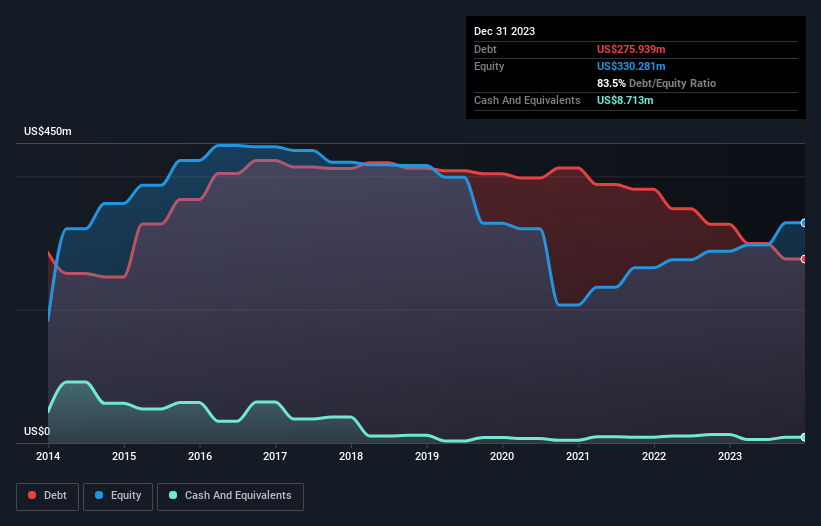- United Kingdom
- /
- Energy Services
- /
- LSE:GMS
Does Gulf Marine Services (LON:GMS) Have A Healthy Balance Sheet?

David Iben put it well when he said, 'Volatility is not a risk we care about. What we care about is avoiding the permanent loss of capital.' So it might be obvious that you need to consider debt, when you think about how risky any given stock is, because too much debt can sink a company. We can see that Gulf Marine Services PLC (LON:GMS) does use debt in its business. But is this debt a concern to shareholders?
What Risk Does Debt Bring?
Debt and other liabilities become risky for a business when it cannot easily fulfill those obligations, either with free cash flow or by raising capital at an attractive price. Part and parcel of capitalism is the process of 'creative destruction' where failed businesses are mercilessly liquidated by their bankers. However, a more frequent (but still costly) occurrence is where a company must issue shares at bargain-basement prices, permanently diluting shareholders, just to shore up its balance sheet. Having said that, the most common situation is where a company manages its debt reasonably well - and to its own advantage. When we examine debt levels, we first consider both cash and debt levels, together.
See our latest analysis for Gulf Marine Services
What Is Gulf Marine Services's Debt?
As you can see below, Gulf Marine Services had US$275.9m of debt at December 2023, down from US$328.1m a year prior. However, it also had US$8.71m in cash, and so its net debt is US$267.2m.

How Strong Is Gulf Marine Services' Balance Sheet?
We can see from the most recent balance sheet that Gulf Marine Services had liabilities of US$99.5m falling due within a year, and liabilities of US$238.6m due beyond that. On the other hand, it had cash of US$8.71m and US$33.3m worth of receivables due within a year. So it has liabilities totalling US$296.0m more than its cash and near-term receivables, combined.
Given this deficit is actually higher than the company's market capitalization of US$229.9m, we think shareholders really should watch Gulf Marine Services's debt levels, like a parent watching their child ride a bike for the first time. Hypothetically, extremely heavy dilution would be required if the company were forced to pay down its liabilities by raising capital at the current share price.
We measure a company's debt load relative to its earnings power by looking at its net debt divided by its earnings before interest, tax, depreciation, and amortization (EBITDA) and by calculating how easily its earnings before interest and tax (EBIT) cover its interest expense (interest cover). The advantage of this approach is that we take into account both the absolute quantum of debt (with net debt to EBITDA) and the actual interest expenses associated with that debt (with its interest cover ratio).
While Gulf Marine Services's debt to EBITDA ratio (3.4) suggests that it uses some debt, its interest cover is very weak, at 1.8, suggesting high leverage. It seems clear that the cost of borrowing money is negatively impacting returns for shareholders, of late. The good news is that Gulf Marine Services grew its EBIT a smooth 39% over the last twelve months. Like a mother's loving embrace of a newborn that sort of growth builds resilience, putting the company in a stronger position to manage its debt. There's no doubt that we learn most about debt from the balance sheet. But ultimately the future profitability of the business will decide if Gulf Marine Services can strengthen its balance sheet over time. So if you want to see what the professionals think, you might find this free report on analyst profit forecasts to be interesting.
Finally, while the tax-man may adore accounting profits, lenders only accept cold hard cash. So we always check how much of that EBIT is translated into free cash flow. Happily for any shareholders, Gulf Marine Services actually produced more free cash flow than EBIT over the last three years. There's nothing better than incoming cash when it comes to staying in your lenders' good graces.
Our View
We feel some trepidation about Gulf Marine Services's difficulty interest cover, but we've got positives to focus on, too. For example, its conversion of EBIT to free cash flow and EBIT growth rate give us some confidence in its ability to manage its debt. Looking at all the angles mentioned above, it does seem to us that Gulf Marine Services is a somewhat risky investment as a result of its debt. That's not necessarily a bad thing, since leverage can boost returns on equity, but it is something to be aware of. There's no doubt that we learn most about debt from the balance sheet. However, not all investment risk resides within the balance sheet - far from it. To that end, you should learn about the 4 warning signs we've spotted with Gulf Marine Services (including 1 which is a bit unpleasant) .
If you're interested in investing in businesses that can grow profits without the burden of debt, then check out this free list of growing businesses that have net cash on the balance sheet.
New: Manage All Your Stock Portfolios in One Place
We've created the ultimate portfolio companion for stock investors, and it's free.
• Connect an unlimited number of Portfolios and see your total in one currency
• Be alerted to new Warning Signs or Risks via email or mobile
• Track the Fair Value of your stocks
Have feedback on this article? Concerned about the content? Get in touch with us directly. Alternatively, email editorial-team (at) simplywallst.com.
This article by Simply Wall St is general in nature. We provide commentary based on historical data and analyst forecasts only using an unbiased methodology and our articles are not intended to be financial advice. It does not constitute a recommendation to buy or sell any stock, and does not take account of your objectives, or your financial situation. We aim to bring you long-term focused analysis driven by fundamental data. Note that our analysis may not factor in the latest price-sensitive company announcements or qualitative material. Simply Wall St has no position in any stocks mentioned.
Have feedback on this article? Concerned about the content? Get in touch with us directly. Alternatively, email editorial-team@simplywallst.com
About LSE:GMS
Gulf Marine Services
Operates self-propelled self-elevating support vessels (SESVs) in the United Arab Emirates, the Kingdom of Saudi Arabia, Qatar, and Europe.
Undervalued with proven track record.


